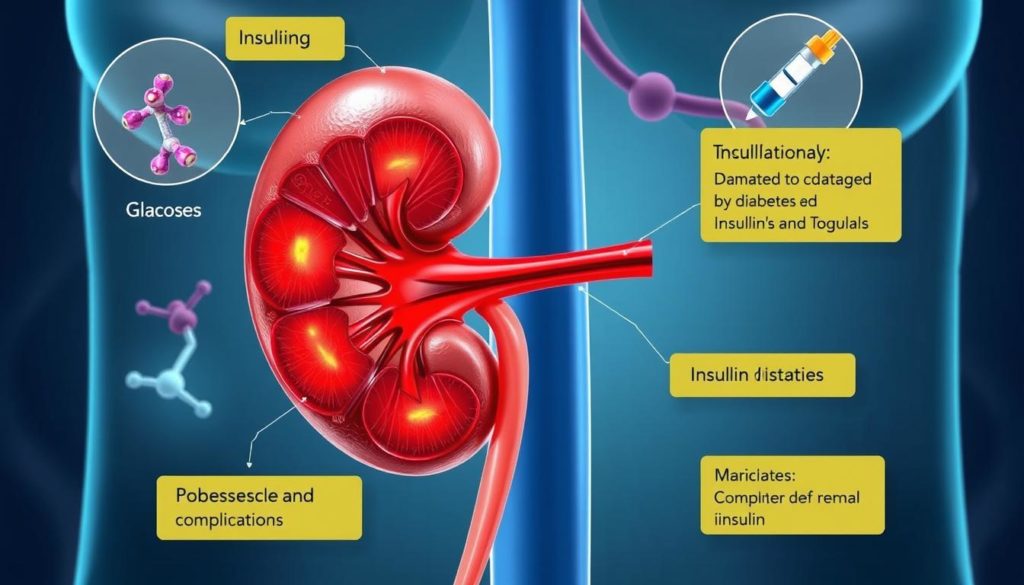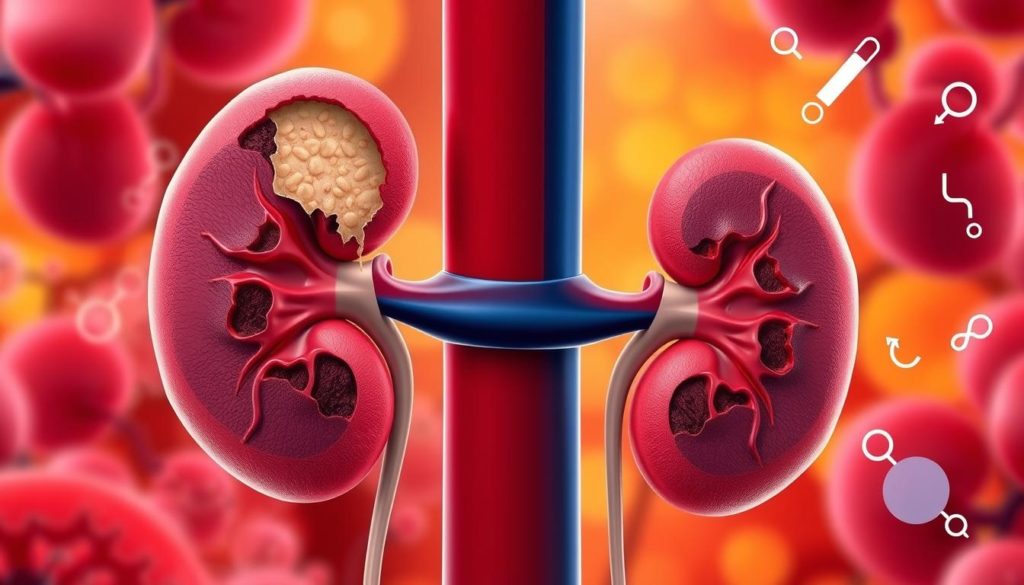About 40% of people with diabetes will get chronic kidney disease (CKD). This fact shows why it’s important to know how kidney disease and diabetes are linked.
Diabetes mellitus and chronic kidney disease are big health problems around the world. Diabetes can make blood sugar levels high. Over time, this can hurt the kidneys. It leads to a complex connection that affects your health and happiness.
We’ll look into how these two illnesses affect each other next. We’ll talk about what this means for public health. And we’ll discuss how managing diabetes can help stop kidney damage. Understanding this can help us see why it’s key to act early and keep taking care of your health.
The Link Between Diabetes and Kidney Disease
Diabetes can greatly raise your risk of kidney problems. This connection is especially true for Diabetic Nephropathy. Many studies show that people with diabetes are more likely to have kidney issues.

Pathophysiological Mechanisms
Several complex processes link diabetes to kidney disease. Oxidative stress plays a key part in harming kidney function. Advanced glycation end products (AGEs) damage renal tissues, worsening Diabetic Nephropathy. Endothelial dysfunction also speeds up kidney health decline in diabetics.
Impact on Public Health
It’s vital to understand how diabetes and kidney disease affect public health. With more people getting diabetes, kidney problems are also on the rise. This requires a comprehensive health care strategy. A huge number of people worldwide are dealing with both conditions. It shows a pressing need for combined medical efforts to tackle these renal complications.
Diabetic Nephropathy: A Major Renal Complication
Diabetic nephropathy is a serious part of Diabetic Kidney Disease. It affects many people’s kidney health. It causes a drop in kidney function, mainly due to long-term diabetes. Understanding this condition is key to manage it early on.

Defining Diabetic Nephropathy
Diabetic nephropathy is a long-term kidney problem. It happens when high blood sugar levels harm the kidneys’ filtering blood vessels. This damage to kidney function can have serious effects if not caught and treated quickly.
Stages of Diabetic Kidney Disease
Knowing how Diabetic Kidney Disease progresses is vital for keeping kidneys healthy. The stages show the level of damage:
- Stage 1: Minimal kidney damage, often with slightly elevated kidney function.
- Stage 2: Mild damage with mild loss of kidney function.
- Stage 3: Moderate damage where a noticeable reduction in kidney function becomes apparent.
- Stage 4: Severe damage, with significant reduction in kidney efficiency.
- Stage 5: End-stage renal disease (ESRD), requiring dialysis or transplantation for survival.
Regular checks and acting early are key to stop the disease from getting to ESRD. This helps protect kidney health and function.
The Role of Diabetes Management in Preventing Kidney Disease
Managing diabetes well is key to stopping kidney disease before it starts. By keeping blood sugar in check and living healthy, people with diabetes can keep their kidneys strong. This is crucial for staying healthy and avoiding serious kidney problems.
Glycemic Control
Keeping blood sugar levels right is at the heart of controlling diabetes. Checking blood sugar regularly and sticking to your meds helps keep it in a safe zone. This protects your kidneys from being overworked and prevents long-term damage.
Tools like continuous glucose monitors (CGMs) make it even easier to watch your sugar levels. This tech can help you keep blood sugar stable without constant finger-pricks.
Lifestyle Interventions
Eating right and staying active are also critical. A good diet and exercise can work wonders for your kidney health. They help prevent serious kidney issues down the line.
A diet full of whole foods and low in processed sugar is best. Regular physical activity not only keeps your weight in check but also boosts heart health. Both are important for keeping your kidneys in good shape.
| Diabetes Management Components | Benefits for Kidney Health |
|---|---|
| Glycemic Control | Reduces kidney damage by maintaining stable blood glucose levels |
| Balanced Diet | Supports overall health and reduces the risk of kidney disease |
| Regular Exercise | Improves cardiovascular health, enhancing kidney function |
| Medication Adherence | Ensures effective blood sugar management, protecting kidney health |
Kidney Function and its Importance in Diabetes
Kidneys are key to our health, especially for those with diabetes. They filter out waste and extra fluids from our blood. This keeps our body’s chemical balance in check. They also help regulate important substances and make vital hormones.
How Kidneys Filter Blood
Each day, our kidneys filter about 200 quarts of blood. They remove roughly 2 quarts of waste and water. This job is done by tiny units called nephrons. When they work well, they help keep our blood sugar levels stable. This helps avoid complications from diabetes.
The Impact of Impaired Kidney Function
Poor kidney function throws off our body’s balance. It causes harmful substances to build up in our blood. For those with diabetes, it makes controlling blood sugar hard. It can cause symptoms like fatigue, swelling, and high blood pressure. Over time, this issue can lead to chronic kidney disease and more diabetes problems.
| Kidney Function | Impact on Diabetes |
|---|---|
| Filtering Blood | Helps control blood sugar levels |
| Regulating Substances | Maintains electrolyte and acid-base balance |
| Hormone Production | Controls blood pressure and promotes red blood cell production |
It’s crucial for people with diabetes to watch their kidney health. Regular doctor visits can spot problems early. Catching issues soon helps manage them and lowers the chance of complications.
Exploring the Symptoms of Kidney Disease in Diabetic Patients
Diabetic patients need to watch their health closely. Understanding kidney disease symptoms is key. Spotting these signs early helps get the right treatment fast. This is vital for detecting kidney issues early.
Early Warning Signs
If you have Diabetes, look out for these kidney disease signs. How your body signals a problem is important to note.
- Fatigue: Feeling unusually tired, even after adequate rest.
- Swelling: Noticeable swelling in the ankles, feet, or hands.
- Changes in Urination: Experiencing either an increase or decrease in the frequency of urination, or noticing foamy, bubbly, or bloody urine.
- Shortness of Breath: Having difficulty breathing can be linked to fluid buildup from impaired kidney function.
When to Seek Medical Attention
It’s crucial to know when to see a doctor. If symptoms persist or new ones appear, get medical help. Regular check-ups and tests are essential.
They help catch kidney disease early in diabetic patients. Urine and blood tests reveal a lot about kidney health. This information guides treatment plans.
Renal Complications of Diabetes: What You Need to Know
Understanding the link between Kidney Disease and Diabetes is critical. This connection leads to various renal complications. These complications greatly affect patient care and management.
Types of Renal Complications
Diabetes can cause serious kidney problems. The most common is Chronic Kidney Disease (CKD). Diabetic nephropathy is distinguished by damage to the kidneys’ filters. Moreover, high blood pressure can worsen kidney function, leading to severe damage. End-Stage Renal Disease (ESRD) is also a severe result, requiring dialysis or a kidney transplant.
- Diabetic Nephropathy
- Hypertension-Induced Kidney Damage
- End-Stage Renal Disease (ESRD)
Long-Term Health Implications
The impact of Renal Complications of Diabetes on long-term health is significant. These complications increase heart risks and demand intense medical care and lifestyle changes. Chronic Kidney Disease can decrease the quality of life, limiting everyday activities. It also puts a strain on healthcare systems.
| Renal Complication | Description | Long-Term Implications |
|---|---|---|
| Diabetic Nephropathy | Damage to the kidney’s filtering units | Increased cardiovascular risks and need for long-term management |
| Hypertension-Induced Kidney Damage | High blood pressure exacerbates renal function decline | Elevated risk of heart disease and stroke |
| End-Stage Renal Disease (ESRD) | Severe loss of kidney function | Often requires dialysis or a kidney transplant |
A comprehensive approach is needed to tackle these complications. Early intervention and preventive measures are key. Managing both Kidney Disease and Diabetes well is vital to slow down these renal issues. This helps protect patients’ overall health.
Managing Diabetes and Kidney Failure Together
Handling both diabetes and kidney failure takes a well-planned strategy. This includes following strict diets, pursuing medical treatments, and considering methods like dialysis or kidney transplants. These combined efforts can lead to better health and a higher quality of life for patients.
Dietary Guidelines
Creating a diabetic diet that suits those with kidney issues is essential. It usually means eating less protein, cutting down on salt, and watching nutrient intake. Foods low in potassium and phosphorus are often part of the plan. These steps are key in controlling both diabetes and kidney failure.
Pharmacological Treatments
Medications are a big part of managing these health issues. Drugs like ACE inhibitors and ARBs can slow kidney damage from diabetes. Aiming to keep blood pressure in check and reduce protein in urine is vital. The National Kidney Foundation stresses the importance of early treatment.
Dialysis and Transplant Options
When facing end-stage kidney disease, dialysis and kidney transplants are key options. Dialysis takes over filtering blood when kidneys fail. Meanwhile, a transplant can mean a longer, better life. Knowing all types of dialysis and transplant rules is important.
| Parameter | Diabetes | Kidney Failure |
|---|---|---|
| Primary Cause | High blood sugar | Diabetes |
| Main Risk Factors | Older age, obesity, family history | High blood pressure, diabetes |
| Treatment | Insulin, oral medications | Dialysis, kidney transplant |
Nutritional Strategies for Kidney Health in Diabetic Patients
Eating right is key for kidney health in diabetics. A diet made for kidney care helps a lot with managing diabetes. It also keeps kidneys working well.
Foods to Avoid
Avoiding certain foods is a must for diabetics who want to take care of their kidneys. Here are some foods to steer clear of:
- Sugary Foods: Sweets, sodas, and candy can make blood sugar levels go up.
- Sodium-Rich Foods: Processed foods, canned soups, and salty snacks can raise blood pressure.
- Unhealthy Fats: Trans fats and saturated fats in fried foods and baked goods can hurt your heart.
Beneficial Dietary Habits
Good eating habits help keep kidneys healthy and manage diabetes well. Add these foods to your meals:
- Fruits and Vegetables: Choose many colors for plenty of vitamins and minerals.
- Lean Protein: Go for fish, chicken, and plant proteins, which are kind to kidneys.
- Whole Grains: Eat oats, brown rice, and quinoa to keep blood sugar steady.
It might seem hard to balance a kidney-friendly diet with diabetes care. But following these guidelines helps keep both in check. This way, you can stay healthier.
Kidney Disease and Diabetes: Common Risk Factors
Understanding the shared Diabetes Risk Factors is key. These factors lead to diabetes and kidney disease. High blood pressure, unhealthy diet, obesity, and family history are major risks. By managing these risks, you can fight against both diseases.
High blood pressure damages kidneys, especially in diabetics. It puts extra strain on kidney blood vessels, harming their function. On the other hand, unhealthy diets raise blood glucose levels. This makes Healthy Lifestyle Choices vital for Kidney Disease Prevention.
Obesity can’t be ignored either. It leads to insulin resistance, complicating blood sugar control. This raises the risk for diabetes and kidney issues. A balanced diet and regular exercise help manage weight and lower disease risk.
Family history matters too. Those with a family history of these conditions should take extra care. Regular check-ups and healthy living can help prevent Kidney Disease Prevention and manage diabetes.
- High blood pressure management through tailored medications and dietary adjustments.
- Adopting a diet low in processed sugars and high in vegetables and lean proteins.
- Regular exercise to maintain a healthy weight and improve insulin sensitivity.
- Frequent medical screenings to monitor blood sugar levels and kidney function.
Making Healthy Lifestyle Choices addresses Diabetes Risk Factors. This significantly cuts the risk of kidney disease and boosts overall health.
Conclusion and Future Perspectives
Understanding how kidney disease and diabetes are linked is crucial. It shapes how we manage these diseases. We’ve looked closely at their complex relationship, including major kidney problems such as diabetic nephropathy. We’ve also discussed the symptoms common in diabetic patients. This shows how important it is to find and treat these issues early.
Managing diabetes well can greatly lower the risk of getting kidney disease. This highlights the role of controlling blood sugar and making lifestyle changes. These steps are key to avoiding serious health problems.
Future treatments look promising for those facing both conditions. New drugs and specific dietary advice can help. So can starting dialysis or considering a transplant early. Also, treating the patient as a whole is crucial for improving life quality.
The future will need a focus on both preventing and treating these diseases. Health workers should use various strategies, including new technology and teaching patients. This approach, along with the latest in medical treatment, offers hope. It supports patients and doctors, making it easier to tackle these tough diseases.
FAQ
What is the link between kidney disease and diabetes?
Diabetes can lead to chronic kidney disease (CKD). High blood glucose can harm your kidneys’ blood vessels. This makes it hard for them to work right. CKD can also make blood glucose control harder, showing why managing diabetes is crucial.
What are the pathophysiological mechanisms behind diabetic nephropathy?
Diabetes and CKD are linked by oxidative stress and other factors. These lead to kidney damage and diabetic nephropathy. This is when kidneys don’t filter blood well.
How does diabetes impact public health in terms of kidney disease?
Diabetes increases public health challenges. It leads to kidney problems that strain health systems and lower life quality. Yet, controlling diabetes can help avoid these issues.
What is diabetic nephropathy?
Diabetic nephropathy means your kidneys are damaged from long-term diabetes. It harms the kidneys’ small blood vessels. This can cause serious kidney issues.
What are the stages of diabetic kidney disease?
Diabetic kidney disease moves through five stages, from slight to total kidney failure. Spotting and managing it early is key to avoiding worse problems.
How important is glycemic control in preventing kidney disease?
Keeping blood sugar in check is key to stopping kidney disease for those with diabetes. Regular checks, medication, and healthy living greatly lower CKD risk.
What are some effective lifestyle interventions for diabetes management?
Good habits for handling diabetes are eating right and being active. Also, not smoking and reducing stress. These actions help keep blood sugar levels healthy and lower kidney disease risk.
How do kidneys filter blood, and what happens when their function is impaired?
Kidneys clean our blood by removing waste and extra fluid. If they’re not working well, wastes build up. This is bad for health and makes controlling diabetes harder.
What are the early symptoms of kidney disease in diabetic patients?
Early signs of kidney disease are feeling tired, swelling, peeing changes, and high blood pressure. Noticing them early helps with managing the condition better.
When should diabetic patients seek medical attention for kidney disease?
If there are ongoing changes in peeing, swelling, tiredness, or other kidney disease signs, get help. Quick action helps stop worse kidney damage.
What types of renal complications can diabetes cause?
Diabetes can cause several kidney issues like diabetic nephropathy and damage from high blood pressure. These can lead to heart problems and other serious conditions.
What are the long-term health implications of renal complications in diabetes?
Kidney problems can increase the risk of heart disease, worsen life quality, and can lead to kidney failure. But, managing diabetes and kidney health can lower these risks.
How can diabetes and kidney failure be managed together?
Treating both involves diet advice, medicine, and sometimes dialysis or transplant. Plans often suggest eating less protein and salt and controlling blood sugar.
What are the dietary guidelines for managing diabetes and kidney health?
Experts suggest eating less protein and salt. Also, avoid sugary and fatty foods. Eat more fruits, veggies, lean proteins, and whole grains to help your kidneys and blood sugar.
What foods should diabetic patients with kidney disease avoid?
Stay away from foods rich in sodium, sugar, and bad fats. Junk food, sweet drinks, and too much protein can hurt your kidneys and mess up blood sugar control.
What are some beneficial dietary habits for kidney health in diabetic patients?
Eating fruits and veggies, picking lean proteins and whole grains, and healthy fats, plus drinking plenty of water, supports your kidneys and manages sugar levels.
What are the shared risk factors between kidney disease and diabetes?
Common risks are high blood pressure, bad diet, obesity, and family history. Lifestyle changes, like more exercise and better eating, can cut down risks for both diseases.


